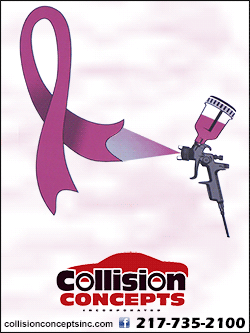|
 For some, breast cancer is never truly over.
Though they may get the disease in check to a certain degree, for
many, the cancer stays with them throughout the duration of their
life. For some, breast cancer is never truly over.
Though they may get the disease in check to a certain degree, for
many, the cancer stays with them throughout the duration of their
life.
This is the story for Kathleen Brumbaugh who is a survivor
twice-over and is also currently a warrior, battling the disease
through oral chemo meds for the rest of her life, as well as dealing
with the impact that metastatic breast cancer is having on other
regions of her body.
Many who attend the Relay for Life of Logan County’s annual walk day
in June each year will recognize Kathleen as one who is always
there, taking part in the Gigglers Relay Team. The Gigglers Team is
made up of members of the Logan County Breast Cancer Support Group,
which Kathleen is currently the ‘president’ or leader of the group.
In the October 25th feature article, LDN will talk more about this
group of lovely ladies, but for this story it is important to know
that they are a close-knit group, and have become a big part of
Kathleen’s journey from patient to survivor and ongoing warrior.

Kathleen received her official diagnosis in 2007, but she had known
for several months that she had breast cancer.
In 2006 she noted changes in her breasts, one was a full cup size
larger than the other. Both were changing in look, and she could
feel her tumors. Kathleen was in a bad situation, one that many
women today face, she had a job but no health insurance and “no
wealthy relatives” to help her out. She was on her own and felt that
she couldn’t afford to go through testing and ultimately treatment.
Kathleen resigned herself to the idea that the cancer would go
unchecked and probably within a few months take her life.
And while she appeared to accept that self-diagnosis, she still
looked for ways to get help. She learned that she could get the
testing she needed through the Illinois Breast and Cervical Cancer
Program offered through the Illinois Department of Public Health.
However, knowing she had cancer didn’t mean that she could do
anything about it.
Finally, Kathleen said it dawned on her that if the IBCCP could
offer free testing, then there were surely ways to also get
treatment. For Kathleen that means of treatment came through
Medicaid. Once those questions were answered, then she was ready to
fight the disease that was raging through both breasts and invading
her lymph nodes.
When all was said and done, her prognosis was quite serious. She
learned, as she had already suspected that she had cancer in both
breasts and the lymph nodes. Her plan of action would include a
radical mastectomy with both breasts to be removed as well as lymph
nodes. She would undergo chemotherapy and radiation. Then she would
have reconstructive surgery.
For Kathleen this was a solitary journey in many ways. Her family
all lived in Michigan. She had aunts that helped get her mother to
Illinois at some of the critical moments, she had members of the
support group who gave her someone to lean on, her church, and in
the later parts of her recovery, a roommate, who helped take care of
the home. Kathleen stressed that she had not included the roommate
in her daily health care, but that person had been invaluable in
taking care of the home, preparing meals, and doing many of the
things that Kathleen was unable to do.

After her treatment, reconstruction therapy was the last part of her
recovery. This took place in 2008 and required multiple surgeries.
Kathleen noted that many patients have two surgeries, but she had to
have three. After her wounds had healed from the mastectomy and
radiation, she underwent a procedure where skin was taken from her
back and grafted onto her chest over temporary implants. The process
for reconstructive surgery takes a lot of time. She explained that
within the temporary implants there are valves that can be opened
for fluid injection. The implant is placed under the skin deflated.
Over time fluid is added to the implants through the valves and the
skin then stretches gradually. When the implants have been filled to
the desired size and the skin has been stretched to accommodate
them, then the temporary implants are removed and permanent implants
put in place.
Kathleen said that the reconstructive surgeries were complicated
because she was a large size lady, but for the most part the
surgeries went well. She noted that something some may not know, is
that once you have the implants put in, you are given a card that
you have to carry in your wallet to present in places like airport
security. She said that the fluid in the implants can set off
security alarms, so the card is to be shown to security personnel
before stepping into the scanners.
Kathleen said that having both breasts removed carried its own
emotional turmoil. For a woman, the breasts are an important part of
the anatomy. She noted that first and foremost, the function of the
breast is directly related to child rearing. While she was 40 years
old when she was going through this and knew in her heart that
children were not in her future, the thought that she no longer had
the ability to nurse a child was sad for her.
And, it is just in general a loss. Kathleen recalled that after all
was said and done, she looked though some of her diagnostic reports
and she saw that the doctors had noted a mole on one of her breasts.
Not a concern for what she was going through, but none-the-less
noted. Kathleen said she thought about that mole, something that had
been a part of her, and now it was gone. She said, “I grieved for my
mole.”
With the treatment completed and the surgeries all done, doctors
believed that they had removed the cancer, and for the next five
years, Kathleen’s annual checks supported that. She passed each
year, and in 2012 was considered to be cancer free. But that would
not last.
[to top of second column] |

In 2013 Kathleen began having issues with her legs.
She had blood clots and had to be put on medications. At the time
the leg pain was not considered to be part of the cancer, but
Kathleen now thinks that it could have been an early warning sign.
In 2016 she found out that her cancer was back,
though she had no breasts, she still had breast cancer. The cancer
had metastasized to her lungs and her pelvic region. She said she
felt that there was something wrong when she developed a cough that
she couldn’t get rid of. In October of that year she visited the
doctor who did tests and looked at her lungs. There was no fluid on
the lungs and the doctor thought that perhaps there was an infection
that could be treated with antibiotics. She went on those meds, but
that didn’t solve the problem.
Kathleen explained that the ultimate diagnosis would come in 2017.
The cough had been caused because the human body tries to take care
of itself. The body knew there was something invasive woven within
the fabric of her lungs, and the cough was an attempt to eject the
invader.
In the first part of 2017, Kathleen experienced fluid on her lungs,
and when she went to the doctor, about two liters was drained off.
Her official diagnosis came around Easter that year, and she was
placed on blood thinners and a daily chemotherapy pill.
The cancer was also discovered in her pelvic area, and Kathleen
relates that this is why she personally believes the leg pain was a
fore runner of her cancer. She said meds she was put on after her
diagnoses resolved the leg pain, and with knowing there is cancer in
the pelvic region, she knows in her own mind at least, that the two
are connected.
Kathleen today takes the chemo pill and will continue to do so for
the rest of her life. She said that the pill has its advantages,
mostly in the fact that one doesn’t lose days of their life to
severe illness after treatment. She also didn’t lose her hair with
the pill.
And, the pill is shrinking her tumors, but will likely never fully
remove them. Surgery is not an option for Kathleen, so her destiny
is that she will continue on with medication and take life one day
at a time.
Kathleen is calm about her prognosis. She looks at life as a daily
event and doesn’t dwell on the long-term all that much. She noted
that when thinking about her own mortality, in 2007 and 2008 she
went through her diagnosis and treatment with the thoughts that she
was going to live to be 80 years old.

Today, AT 52 her feeling is that she probably won’t live to see 60.
But she qualifies her statement saying that she really doesn’t know
why. “Maybe Jesus will come,” she said. Or maybe she will lose her
life in a car accident, or maybe there will be some big discovery in
cancer treatment and she will live beyond her own expectations. Her
point is that none of us know what is going to happen tomorrow or a
week from tomorrow.
The gift is to live a good life each day. Enjoy what you have in
front of you, and don’t dwell on the “what if” or the “whenever.”
And, if Kathleen has any message to send to those who are facing
situations similar to hers, it is definitely don’t give up. Always
keep looking for a way to overcome the obstacles.
When Kathleen was diagnosed in 2007, she had a job but no insurance.
She felt her destiny was sealed, but then she found out that she
could get help through the IBCCP.
The Illinois Breast and Cervical Cancer Program is administered by
the Illinois Department of Public Health and it offers services to
women in Illinois between the ages of 35 and 64 with no health
insurance. If you are in this situation you can contact the IBCCP by
calling the Women’s Health-Line toll free at 888-522-1282.
Women in this situation can also get free mammograms, locally.
Abraham Lincoln Memorial Hospital is participating in the October
Mammogram Monday’s project. Women who do not have insurance can make
an appointment today, to have a free mammogram before the end of the
month. To make that appointment call 217-605-5108.
While Kathleen’s story is one of struggle, she reminds everyone that
cancer has a unique personality with each person it infects. Because
she had these kinds of issues doesn’t mean the next person will.
Don’t be afraid to seek help because you hear a bad story or a scary
story, because you will write your own story, starting with being
proactive and finding out the truth about what is going on in your
body.

Kathleen is a lovely lady with a big heart for others. She works to
help where she can, and be an example of fighting the good fight,
even against the odds. She lives her life one day at a time and
spends no time wallowing in self-pity. She also doesn’t want pity
from others. She simply wants her days to be of value.
To quote Abraham Lincoln, “It is not the years in your life that
count, but the life in your years.”
Thank you Kathleen for sharing your story. Your hope and ours is
that your story will show someone else that there is help to be
found, and that victory begins when they choose to be proactive.
Additionally, we all hope that the work done in cancer research will
bring that big cure we all want, and that you will be among the
first to benefit from it.
[Nila Smith] |